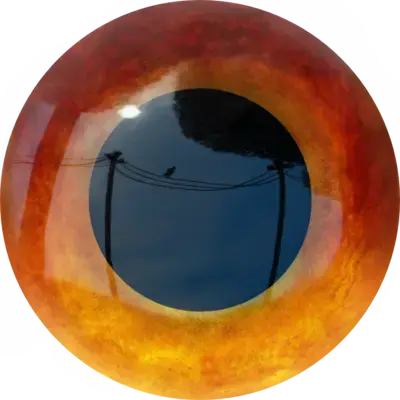Why Linux is portrayed as a Penguin?
The penguin's name is "Tux" and he's the official Linux mascot.
I think Linus Torvalds picked it a long time ago, he said he wanted something that was non-threatening, so hence the penguin lol.
The debate about Linux vs GNU/Linux imo, is one of the stupidest and pedantic debates I've ever heard. Maybe it mattered 30+ years ago when things were much less developed and only hardcore nerds and programmers used it, but now days it's only important to grognards and neckbeards.
Hot take, but it's like those pretentious music enthusiasts that will argue about what precise genre an artist fits into. "I would say they are post-progressive indie skitzo-pop. No way! They are clearly more neo-grunge sca-punk with post-rock elements" who cares?? Have your ultra-precise categories in your personal music collection all you want, but acting like it's based on some hardcore objective truths of the universe is stupid.
Nobody is confused when I say I run Linux as my OS. Actually, people do get confused but it's not because of GNU/Linux, it's because they haven't ever heard of Linux and thought that Windows and MacOS were the only 2 OSes for computers.
If somebody genuinely pulled an "um, actually" on me for saying Linux vs GNU/Linux, I would scream laugh loudly and then change the subject.
Um actually it's called ska, not sca
I was about to draw out nukes over it.
I wonder how far back Richard Stallman set the free software movement by being absolutely cock slamming terrible at naming things. "I'm going to name my operating system after the sound my throat makes while swallowing a whole goldfish."
If that bothers you, you should read the GNU FAQ page… About half of it consists of variations on "but why GNU/Linux", including my personal favorite where they discuss why it's not GNU Linux: https://www.gnu.org/gnu/gnu-linux-faq.html#whyslash and how you need to pronounce the slash: https://www.gnu.org/gnu/gnu-linux-faq.html#pronounce
deleted by creator
deleted by creator
It's not unusual to see people talking about android users being Linux users "because android is Linux too" clearly not understanding the difference between Linux the OS, i.e. GNU/Linux, and Linux the kernel. So it's useful when you have to make such a distinction.
Exactly. When I say I want a Linux phone all I get are Android options. What I want is a GNU/Linux phone that I can run full Linux distros on.
Alpine or PostmarketOS works for older stuff. Some others will run Ubuntu as well.
Instead of "Linux on [phone]" try using Debian/Ubuntu or one of the mobile-targeting distros as a keyword
Alpine
Alpine is also arguably not "GNU/Linux", as it doesn't use GNU Core Utils or glibc. But I don't know anyone who would suggest that Alpine isn't "proper Linux".
deleted by creator
deleted by creator
Unfortunately for them this means that 99.99% of the Linux distributions out there do not qualify as >GNU/Linux, even the ones like Debian, Red Hat, or Ubuntu that did adopt the GNU/Linux name >scheme, because they all host, promote, or allow users access to non-free software in some way.
You are totally confused. In words of R. Stallman:
"The kernel is an essential part of an operating system, but useless by itself; it can only function in the context of a complete operating system. Linux is normally used in combination with the GNU operating system: the whole system is basically GNU with Linux added, or GNU/Linux. All the so-called “Linux” distributions are really distributions of GNU/Linux".
"Today there are many different variants of the GNU/Linux system (often called “distros”). Most of them include nonfree programs".
deleted by creator
I recently found myself forced to give a shit, when one of our projects started doing weird shit after switching to an Alpine-based docker image.
Can you elaborate? I'm aware alpine uses non-GNU stuff like musl & busybox. But overall, they're not too far off.
It was a dependency resolution issue. Npm couldn't install one of the packages without some package.json gymnastics, and those same gymnastics somehow fucked with our debian based images that we use for development. I can't say much more because I honestly don't know what exactly happened. I just diagnosed the issue and forwarded it to our resident node guru, who took it from there.
Here we go. …
Linux is the kernel.
Gnu refers to the userland tools.
Many say gnu no longer really applies as the userland tools are provided by more than GNU's specific set.
I understand why Stallman wanted us to say GNU/Linux, because his organization needs money and wants its name out there, but that's simply not how things get named in the real world.
First, GNU was always a mouthful. It's always been intentionally pronounced differently from the animal. People prefer names that are not confusing and that don't sound strange.
Second, we don't do the same thing for other operating systems. If you're an illustrator, you don't say that you work on Adobe/Windows or whatever.
Third, GNU/Linux adds nothing interesting over simply "Linux". And in fact, there have been distributions where they avoid GNU tooling due. Everybody still recognizes these as Linux.
Agreed. Names don't work that way. Should we just append any remotely relevant info to the name? "I use Arch/Systemd/Gnu/Linux-AMD 5 7700X, webcam connected, 2000 dpi mouse BTW"
Yea totally with you there.
Let me interject for a moment …
"I'd just like to interject for a moment. What you're refering to as Linux, is in fact, GNU/Linux, or as I've recently taken to calling it, GNU plus Linux. Linux is not an operating system unto itself, but rather another free component of a fully functioning GNU system made useful by the GNU corelibs, shell utilities and vital system components comprising a full OS as defined by POSIX. Many computer users run a modified version of the GNU system every day, without realizing it. Through a peculiar turn of events, the version of GNU which is widely used today is often called Linux, and many of its users are not aware that it is basically the GNU system, developed by the GNU Project. There really is a Linux, and these people are using it, but it is just a part of the system they use. Linux is the kernel: the program in the system that allocates the machine's resources to the other programs that you run. The kernel is an essential part of an operating system, but useless by itself; it can only function in the context of a complete operating system. Linux is normally used in combination with the GNU operating system: the whole system is basically GNU with Linux added, or GNU/Linux. All the so-called Linux distributions are really distributions of GNU/Linux!"
No, Richard, it's 'Linux', not 'GNU/Linux'. The most important contributions that the FSF made to Linux were the creation of the GPL and the GCC compiler. Those are fine and inspired products. GCC is a monumental achievement and has earned you, RMS, and the Free Software Foundation countless kudos and much appreciation. Following are some reasons for you to mull over, including some already answered in your FAQ. One guy, Linus Torvalds, used GCC to make his operating system (yes, Linux is an OS – more on this later). He named it 'Linux' with a little help from his friends. Why doesn't he call it GNU/Linux? Because he wrote it, with more help from his friends, not you. You named your stuff, I named my stuff – including the software I wrote using GCC – and Linus named his stuff. The proper name is Linux because Linus Torvalds says so. Linus has spoken. Accept his authority. To do otherwise is to become a nag. You don't want to be known as a nag, do you? (An operating system) != (a distribution). Linux is an operating system. By my definition, an operating system is that software which provides and limits access to hardware resources on a computer. That definition applies whereever you see Linux in use. However, Linux is usually distributed with a collection of utilities and applications to make it easily configurable as a desktop system, a server, a development box, or a graphics workstation, or whatever the user needs. In such a configuration, we have a Linux (based) distribution. Therein lies your strongest argument for the unwieldy title 'GNU/Linux' (when said bundled software is largely from the FSF). Go bug the distribution makers on that one. Take your beef to Red Hat, Mandrake, and Slackware. At least there you have an argument. Linux alone is an operating system that can be used in various applications without any GNU software whatsoever. Embedded applications come to mind as an obvious example. Next, even if we limit the GNU/Linux title to the GNU-based Linux distributions, we run into another obvious problem. XFree86 may well be more important to a particular Linux installation than the sum of all the GNU contributions. More properly, shouldn't the distribution be called XFree86/Linux? Or, at a minimum, XFree86/GNU/Linux? Of course, it would be rather arbitrary to draw the line there when many other fine contributions go unlisted. Yes, I know you've heard this one before. Get used to it. You'll keep hearing it until you can cleanly counter it. You seem to like the lines-of-code metric. There are many lines of GNU code in a typical Linux distribution. You seem to suggest that (more LOC) == (more important). However, I submit to you that raw LOC numbers do not directly correlate with importance. I would suggest that clock cycles spent on code is a better metric. For example, if my system spends 90% of its time executing XFree86 code, XFree86 is probably the single most important collection of code on my system. Even if I loaded ten times as many lines of useless bloatware on my system and I never excuted that bloatware, it certainly isn't more important code than XFree86. Obviously, this metric isn't perfect either, but LOC really, really sucks. Please refrain from using it ever again in supporting any argument. Last, I'd like to point out that we Linux and GNU users shouldn't be fighting among ourselves over naming other people's software. But what the heck, I'm in a bad mood now. I think I'm feeling sufficiently obnoxious to make the point that GCC is so very famous and, yes, so very useful only because Linux was developed. In a show of proper respect and gratitude, shouldn't you and everyone refer to GCC as 'the Linux compiler'? Or at least, 'Linux GCC'? Seriously, where would your masterpiece be without Linux? Languishing with the HURD? If there is a moral buried in this rant, maybe it is this: Be grateful for your abilities and your incredible success and your considerable fame. Continue to use that success and fame for good, not evil. Also, be especially grateful for Linux' huge contribution to that success. You, RMS, the Free Software Foundation, and GNU software have reached their current high profiles largely on the back of Linux. You have changed the world. Now, go forth and don't be a nag. permalinkembedsavereportgive goldreply
I like when it says “permalinkembedsavereportgive goldreply”, so deep!
mmm…gnu/pasta. delicious
You mean GNU/Linux/pasta, gotta have that clarification in there.
You're denying tomato's important components. I would appreciate it if you called it "Tomato Sauce/GNU/Linux/Pasta" naturally Tomato should come first as it sits on top of everything else, and in sheer amount of color, is more visible.
Love it lol
https://i.imgur.com/vwQ1VFC.png
FFS lol, why don't we skip the pedantry and just call it Gary already
Why Linux is portrayed as a Penguin?
Both. Richard and Linux paved the way for what all FOSS and the world currently is
BTW/Arch
❤️
Are those your pronouns?
they are now!
https://en.m.wikipedia.org/wiki/Tux_(mascot)
TIL, Linus Torvalds just likes penguins.
Yeah, he's just based like that
Linux/GNU. GNU would never have been widely adopted anywhere without the Linux kernel. Plus, Linux can be made to run with alternatives to GNU. Putting GNU first is putting the cart before the horse.
Actually it might be the opposite, without the GNU initiative, Linus may not have found any interest in developing the Linux kernel. Without the GPL license, the efforts of the GNU community would not have been spent on Linux.
If the horse walks backwards it still works, right?
For most people Linux is useless without GNU. A kernel alone doesn't make an OS.
Gun/Linux 🔫
I love them all, man.
GNU+Linux 😀
🤓🤓🤓
Both, at alternate times to mess with the enemy
Why Linux is portrayed as a Penguin?
According to one alternative posted in the past by a member of the Furry community?
But yeah, you're wrong. Linux is predominantly portrayed by a penguin mascot, Tux. Some distros are named after penguin species too (Gentoo for example)
Oh THATS why it's called Gentoo!
I knew it was a penguin and I knew about the distro, but I never put the two together
Originally, AFAIK it was between Xenia and Tux, and Tux won.
I think for obvious reasons, hahaha. Tux still seems like a nornal animal-penguin. Not too many people like anthropomorphised animal characters, especially if they suddenly wear clothes and walk on their hind legs. Just gives of Disney-esque furry vibes.
It depends on what matter to you. I use a GNU/Linux distribution and I call it that such because I think the project deserves to be better known. I say FLOSS rather than FOSS because I value freedom.
Neither it’s GNU^Linux (read: GNU to the power of Linux)
















